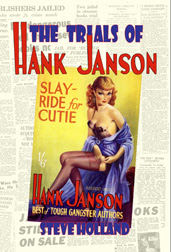Perhaps one of the reasons was that defamation laws in America differed from state to state, although it was possible to bring libel actions against the same defendant in any number of different jurisdictions (known as the "multiple publication rule"), a legal device since abandoned in the USA. [see, for instance, Libel Lessons From Across the Pond: What British Courts Can Learn from the United States' Chilling Experience with the 'Multiple Publication Rule" in Traditional Media and the Internet by Itai Maytal (http://www.swlaw.edu/pdfs/jimel/3_1_maytal.pdf)] The same system was (and still is) applicable in the UK: what became known as the Duke of Brunswick rule derived from an 1849 case which meant that the purchase of a newspaper, magazine or book constituted a separate "publication". In practical terms, it meant that a case against a single American newspaper or magazine could result in action against anyone stocking or distributing the title.
Thus, one of the unexpected issues that came to light with the import of American magazines to Britain was that of libel.
The earliest example I have been able to find in respect of what might be called a popular magazine dates from 22 June 1927 when Benjamin William Batten, joint secretary of the London branch of the Musicians' Union, claimed damaged for an alleged libel published in the 25 August 1926 issue of Variety. The defendent was the Pall Mall Deposit and Forwarding Company Ltd., who distributed copies of the paper in the UK.
In opening the case before the Lord Chief Justice at the King's Bench Division, Sir Patrick Hasatings, K.C., speaking for the plaintiff, said that the distributor of a newspaper was not liable as the publisher of a libel in the newspaper if he could prove that he had not known that the newspaper contained the libel, that his ignorance was not due to any negligence on his part, and that he had no ground for supposing that the newspaper was likely to contain libellous matter. [The law here is laid down in Emmens v. Pottle (16 QBD 354) and Vizetelly v. Mudie's Select LIbrary, Ltd. ([1900] 2 QB 170)]
The defendants, he continued, relied on that defence and it was his role to prove that the defendents ought to have satisfied themselves of the contents of the newspaper before they distributed it.
In this instance, the alleged libel hinged on regulations brought in to aid British musicians find work. In 1921, limits were placed on the number of foreign musicians and the Musicians' Union and the authorities at the Home Office assisted each other in making decisions as to whether individual foreign musicians should or should not be allowed to enter the country.
Mr Batten's son was involved in the Savoy Havana Band that played at the Savoy Hotel, which included a number of American musicians. In August 1926, Mr. de Mornys, the musical director of the Savoy Hotel, was in the United States to choose one or two American musicians to play in the UK. The regulations restricting Americans from playing had proven controversial and the 18 August issue of Variety published an article in which the writer, discussing the recent controversy of American bands having been refused permission to enter England, commented on the fact that an Englishman had come to America to engage Americans for London.
The concluding paragraph read:
One deduction has it that Reggie Batten, who is band leader at the Savoy Hotel, London, is the son of the secretary of the British Musicians' Union, and can accordingly arrange for the necessary permits to suit convenience if desiring to import American music men.Mr. de Mornys telegraphed Mr. Batten asking him to take steps to prevent the sale of that issue of Variety in England. Mr. Batten went to the offices of Pall Mall Deposit and Forwarding Company, who had been distributing Variety in the UK for 25 years, and showed them Mr. de Mornys's telegram, and a representative of the defendent said that he would take steps to see that when the newspaper arrived in this country it would not be distributed.
In the next issue of Variety, an article appeared that stated that Mr. de Mornys had telegraphed the British Musicians' Union in order to attempt to restrain the distribution of the August 18 issue. It then gave the effect of the previous article and repeated the concluding paragraph.
Mr. Edward John Doble, managing director of Pall Mall Deposit and Forwarding, admitted when cross-examined by Sir Patrick Hastings that it was possible from the passage to believe it suggested that Mr. Batten could be actuated, because of his son, in favour of the Savoy Band in preference to others. Further cross-examination elicited the information that his company distributed on average 60 copies of Variety every week.
Defending Mr. Doble's company, Mr. Ernest Charles, said that the defendants' experience after 25 years of distribution was that Variety was not a newspaper in which libels were published. The company had refused to handle the issue of August 18 following the warning received from De Mornys. How could his client be expected to know that the issue for August 25 would repeat the offence, argued Mr. Charles, who also described as "rubbish" Mr. Batten's suggestion that, because of the words complained of, he had been held up to public scandal and hatred.
In his summing-up the following day, the Lord Chief Justice explained the law and said that the jury might think that the defendants had been altogether too casual in dealing with the issue of Variety of August 25 after being warned of libellous matter which had appeared in the issue of August 18.
Mr. Batten had brought the action to show that what had been stated was absolutely untrue and to vindicate his position and character. The jury returned a verdict for Batten, assessing the damages at £100, with costs.
The case had a sequel in a second case against another distributor of Variety, Daws Shipping Agency. When approached by Mr Batten, following his receipt of a telegram from Mr. de Mornys, Mr. Robert Daws assured him that the matter would be dealt with. When Mr. Batten called again, Mr. Daws told him that the offending paragraph had been cut out of copies.
When Mr. Batten went back a week later and picked up a copy of the August 25 issue, Daws had jokingly said "You are not going to sue us for libel, are you?" Unfortunately, Batten found that the libel of August 18 had been repeated in this issue and did indeed sue.
The defendents argued that, following Batten's second visit, Batten had thanked Daws for the courteous and proper manner in which he had dealt with the libel in the issue of August 18 (excising the offending paragraph) and told him that, if there were any further trouble, he would let him know.
Since Daws had heard nothing more, he reasonably concluded that there was no further trouble. As he had distributed Variety for 26 years without complaint, Daws said, he had no reason to suppose that there would be any repetition of the libel in the issue of August 25.
However, a new jury convened to hear this second case also returned for the plaintiff and Daws Shipping Agency was fined £25 damages, with costs.
Appeals against the judgements were heard at the Court of Appeal on 18 November 1927 before the Master of the Rolls, who, in giving judgement, said that the defence offered by both companies was based on Emmens v. Pottle. This defence was, in part, that the defendants "had no ground for supposing that the newspaper was likely to contain libellous matter". However, in both cases being considered, the defendants had taken no particular care to examine the issue of August 25 before distributing it, despite having the issue of August 18 "as a danger signal before them". Lord Justice Atkin and Lord Justice Lawrence delivered judgement to the same effect and the appeals were dismissed with costs.
Sources: Portsmouth Evening News (24 June 1927), The Times (23 June 1927, 24 June 1927, 19 November 1927), Yorkshire Post (24 June 1927), Variety (18 August 1926, 25 August 1926), Wells Journal (23 March 1937).

























































No comments:
Post a Comment